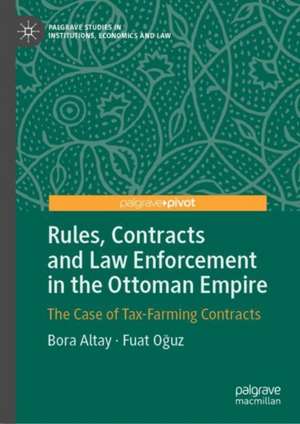Rules, Contracts and Law Enforcement in the Ottoman Empire: The Case of Tax-Farming Contracts: Palgrave Studies in Institutions, Economics and Law
Autor Bora Altay, Fuat Oğuzen Limba Engleză Hardback – 13 oct 2021
Preț: 483.70 lei
Nou
Puncte Express: 726
Preț estimativ în valută:
92.57€ • 100.51$ • 77.76£
92.57€ • 100.51$ • 77.76£
Carte tipărită la comandă
Livrare economică 23 aprilie-07 mai
Preluare comenzi: 021 569.72.76
Specificații
ISBN-13: 9783030795764
ISBN-10: 3030795764
Pagini: 116
Ilustrații: IX, 116 p. 8 illus., 4 illus. in color.
Dimensiuni: 148 x 210 mm
Greutate: 0.32 kg
Ediția:1st ed. 2021
Editura: Springer International Publishing
Colecția Palgrave Macmillan
Seria Palgrave Studies in Institutions, Economics and Law
Locul publicării:Cham, Switzerland
ISBN-10: 3030795764
Pagini: 116
Ilustrații: IX, 116 p. 8 illus., 4 illus. in color.
Dimensiuni: 148 x 210 mm
Greutate: 0.32 kg
Ediția:1st ed. 2021
Editura: Springer International Publishing
Colecția Palgrave Macmillan
Seria Palgrave Studies in Institutions, Economics and Law
Locul publicării:Cham, Switzerland
Cuprins
1 The Rule of Law in the Historical Context.- 2 The Institutional Change: Historical Background.- 3 Fundamental economic indicators of the Ottoman Economy.- 4 A comparison with European societies under the State Finance.- 5 Tax -farming contracts.- 6 Law and economics of tax-farming contracts.- 7 Prisoner’s Dilemma as a tool to analyze tax-farming institutions.- 8 Commitment Problems and the Law Enforcement.- 9 A comparison with France.- 10 Concluding Remarks.
Notă biografică
Bora Altay is an Economist at the Ankara Yildirim Beyazit University, Turkey.
Fuat Oğuz is Professor of Economics at Ankara Yildirim Beyazit University, Turkey.
Textul de pe ultima copertă
This book examines the role of institutions and law on the economic performance of the Ottoman Empire between 1500 and 1800. By focussing on the pre-industrial period, the transition to industrialisation and the mechanisms behind it can be explored. Particular attention is given to the allocation of financial resources towards more productive and efficient economic activities and the role this played in economic divergence among societies. A comparative analysis with European societies highlights the importance of non-economic institutions during the pre-industrial period.
This book aims to provide new analytical perspectives and ways of thinking about how the Ottoman Empire lost its powerful economic and political structures. It is relevant to students and researchers interested in economic history, law and economics, and the political economy.
Bora Altay is an Economist at the Ankara Yildirim Beyazit University, Turkey.
Bora Altay is an Economist at the Ankara Yildirim Beyazit University, Turkey.
Fuat Oğuz is Professor of Economicsat Ankara Yildirim Beyazit University, Turkey.
Caracteristici
Employs primary resources to examine the transfer of resources within the Ottoman Empire Imposes game-theoretical models and perspective to understand what economic and non-economic variables Examines institutional differences and their effects on different societies




